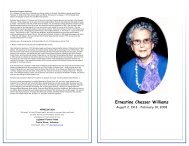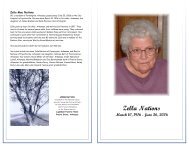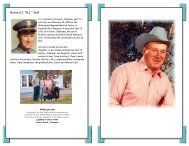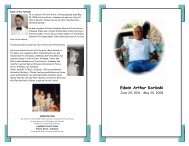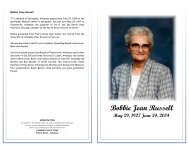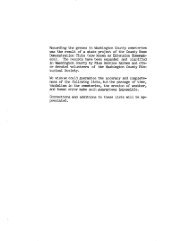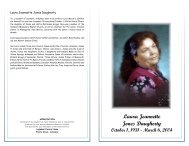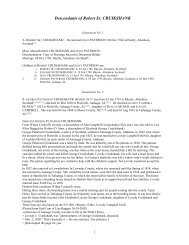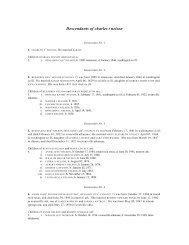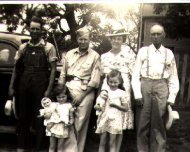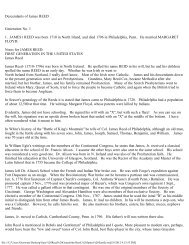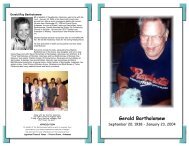Luginbuhl, Gilgeni Family - Luginbuel Funeral Home
Luginbuhl, Gilgeni Family - Luginbuel Funeral Home
Luginbuhl, Gilgeni Family - Luginbuel Funeral Home
- No tags were found...
Create successful ePaper yourself
Turn your PDF publications into a flip-book with our unique Google optimized e-Paper software.
A tall, ornate headstone, etched with age, marks the final resting place of a Nebraska pioneer named John Luginbill.<br />
He was born more than 160 years ago near Bern, Switzerland, and died June 29, 1897 in Richardson County,<br />
Nebraska.<br />
John is buried in Four-Miles Cemetery, a picturesque setting of gentle rolling hills and valleys punctuated by<br />
timberlands that follow streams snaking their way toward the Missouri River.<br />
The Luginbill family migrated to American in 1829. They made the Atlantic crossing in a sailing ship and the trip<br />
through the Appalachian mountains was accomplished by wagon train.<br />
The family settled in or near Waynesburg or Winesburg (Stark County), Ohio, about 1830. The 1850 Federal Census of<br />
Holmes County, Ohio records the young man's age as 24 and that he was married to Elizabeth Welti. She too, was born<br />
in Switzerland and had come to America when two year's old.<br />
Census records of 1860 show the family has moved further west to Andrews County, Missouri. This move, probably<br />
about 1853, was the next to last stop for the John Luginbill family since records show they were in Nebraska in 1856.<br />
Note: History of Richardson County, Nebraska list the following family member at the FIRST REGISTER OF<br />
SETTLER'S CLAIM<br />
John Luginbill - October 3, 1854: Peter Luginbill - October 3, 1854: Christian Luginbill - October 3, 1854: (Peter and<br />
Christian brothers of John Luginbill).<br />
Nebraska, still a Territory, was blessed with rich, black soil that produced abundant crops for a growing young nation.<br />
This was the end of the rainbow for John <strong>Luginbuel</strong>. Here he put down roots, and here he remained. By this time there<br />
were two new additions to the family: Elizabeth and Rosena. Older members for the family were William H., Peter,<br />
Mary C., Henrietta, and John -- for a total of seven children.<br />
It should be said that in 1854 a settler could homestead 160 acres, live on for six months, and then buy it from the<br />
U.S. Government for $1.25 an acre. At the time they called it preemption, and that is the road John traveled, but it<br />
wasn't an easy one.<br />
Historians note that the frontier in those days was no place for weaklings. Only the fittest could endure the hardships,<br />
privations, and dangers of everyday living. Although friendly and helpful, the Indian was a factor.<br />
One anecdote has it that John owned a pair of oxen he obviously had brought from Ohio. One winter day while<br />
logging. Indians made off with his one and only team. Promptly he picked up a gun and trailed them through the snow<br />
to Brownsville, Nebraska. After confronting the culprits in language they understood, they returned the oxen and John<br />
returned home.<br />
Without question, the winter of 1854-55 was to be a hard one for the Luginbills. They lived in a log cabin in that<br />
provided few comforts, especially with seven children. The, too, the weather was harsh and provisions were scarce.<br />
The daughters learned to spin wool and weave cloth to keep the family warm. John and his sons tended the livestock in<br />
makeshift shelters and melted snow to drinking water. By springs they were ready to go into the fields.<br />
A set back of sorts occurred a few years later when President Buchanan signed legislation requiring payment of the<br />
$1.25 per acre that John had signed up to buy. He had no choice but to take the inheritance money and savings of the<br />
entire family to pay for the title to his 160 acres.<br />
From that point on, however, the John Luginbill family fortunes began to look better. Besides the land John had found<br />
through homesteading rights, deals were struck with Indian Chiefs for additional acreage and, little by little, John<br />
Luginbills holding became substantial.<br />
Meantime, the country was going through an era of turmoil and agony. They abolished slavery in 1865; The Civil War<br />
file:///C|/Users/Alienware/Desktop/<strong>Luginbuel</strong>%20<strong>Family</strong>.txt[12/1/2011 5:56:40 AM]



